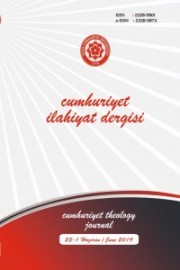Mehmed Saîd’in Kasîde-i Hamriyye Şerhi: Tarab-engîz
Commentary of Meḥmed Said on Qaside-i Khamriyya: Ṭarab-angiz
Author(s): Yılmaz ÖksüzSubject(s): Islam studies, Turkish Literature, 19th Century
Published by: Cumhuriyet Üniversitesi İlahyat Fakültesi
Keywords: Turkish-Islamic Literature; Ibn-i Fārıḍ; Qaside-i Khamriyya; Comment; Meḥmed Said; Ṭarab-angiz;
Summary/Abstract: Qaside-i Khamriyya (meaning Wine Eulogy) of sufi poet Ibn-i Fārıḍ, in which he explained divine love through the metaphor of wine, attracted great attention in Islamic world and was translated into Arabic, Persian and Turkish. Scholars such as Davud-i Qayseri (d. 751 AH/1350 AD), Kemal Pashazāde (d. 940 AH/1534 AD), Abdulghani an-Nablusi (d. 1143 AH/1731 AD), Ibn Acibe (d. 1224 AH/1809 AD) explained this eulogy in Arabic, while poets such as Ali b. Shihābiddin al-Hamadāni (d. 786 AH/1385 AD), Molla Cāmi (d. 898 AH/1492 AD), Idris-i Bitlisi (d. 926 AH/1520 AD) wrote commentaries in Persian. On the other hand, authors such as Abdussalam b. Numan b. Khalil (d. 1000 AH/1592 AD [?]), Ismail Anqaravi (d. 1041 AH/1631 AD), Abdulmacid-i Sivasi (d. 1049 AH/1639 AD), Qara Musṭafa Khulūsi (d. 1344 AH/1926 AD), Meḥmed Naẓım (d. 1345 AH/1926 AD) and Ṭahir al-Mavlavi (d. 1371 AH/1951 AD) translated the eulogy into Turkish. One of the authors who translators of this eulogy was Mehmed Said Efendi, sheikh of Uskudar Salimiya Takka, who lived in the 19th century. His work named Ṭarab-angiz (meaning Pleasure-provoking) is a condensed commentary with ornate prose of Qaside-i Khamriyya. In previous studies, Ṭarab-angiz was partly examined, and there was no mention about the identity and personality of the author. In the present research, the life and personality of Meḥmed Said Efendi is explained and the text of his work is examined.
Journal: Cumhuriyet İlahiyat Dergisi
- Issue Year: 23/2019
- Issue No: 1
- Page Range: 395-415
- Page Count: 19
- Language: Turkish

